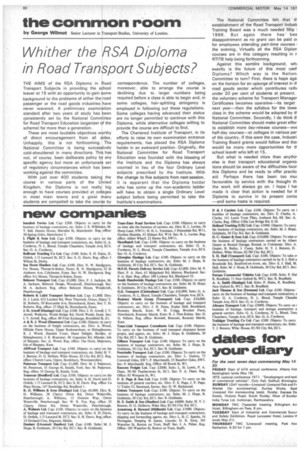Whither the RSA Diploma in Road Transport Subjects?
Page 62

If you've noticed an error in this article please click here to report it so we can fix it.
THE AIMS of the RSA Diploma in Road Transport Subjects in providing the school leaver at 15 with an opportunity to gain some background to the problems of either the road passenger or the road goods industries have never wavered. A preliminary examination standard after two years of study has been consistently set by the National Committee for Road Transport Education (organizer of the scheme} for more than a generation.
These are most laudable objectives worthy of direct encouragement from all sides. Unhappily, this is not forthcoming. The National Committee is being successively cold-shouldered in many directions. This has not, of course, been deliberate policy by any specific agency but more an unfortunate set of regulatory circumstances which has been working against the committee.
With just over 400 students taking the course in various parts of the United Kingdom, the Diploma is not really big enough to have courses provided at colleges in most main towns and a great many students are compelled to take the course by correspondence. The. number of colleges, moreover, able to arrange the course is declining due to. larger numbers being required before a class is able to begin and, in some colleges, hair-splitting stringency is employed in following out these regulations. Some colleges having advanced their status are no longer permitted to continue with this Diploma, while alternative colleges willing to provide the course are difficult to find.
The Chartered Institute of Transport, in its efforts to raise its own examination entrance requirements, has placed the RSA Diploma holder in an awkward position. Originally, the National Committee for Road Transport Education was founded with the blessing of the Institute and the Diploma has always counted in lieu of the four Ordinary Level subjects prescribed by the Institute. With the change to five subjects from next session. it is apparent that the Diploma holder who has come up the non-academic ladder will have to obtain a single Ordinary Level subject before being permitted to take the Institute's examinations.
The National Committee felt that tt establishment of the Road Transport Indust Training Board was a much needed fillip I 1966. But again there has bee disappointment as no grant can be paid oi for employees attending part-time courses' the evening. Virtually all the RSA Diplorr courses are in this category resulting in r RTITB help being forthcoming.
Against this sombre background, wh exactly is the future of this most usef Diploma? Which way is the Nationl Committee to turn? First, there is hope aga on the horizon for an upsurge of interest in ft road goods sector which contributes rathl under 20 per cent of students at present. the voluntary scheme for Transport Manager Certificates becomes operative-its target next year-then the syllabus for the lowe class in the scheme would be adopted by tt National Committee. Secondly, I do think tt National Committee should make great effor to establish more day-release courses-evE half-day courses-at colleges in various par of the country. If this were the case, lndustri Training Board grants would follow and thei would be many more opportunities for if school leaver who left at 15.
But what is needed more than anythir else is that transport educational organiz tions should be aware of the difficulties facir this Diploma and be ready to offer practic aid. Perhaps there has been too mut favourable lip service with the thought th the work will always go on. I hope I has made it clear that action is needed for ti Diploma to survive in its present conte -and some haste is required.




































































































